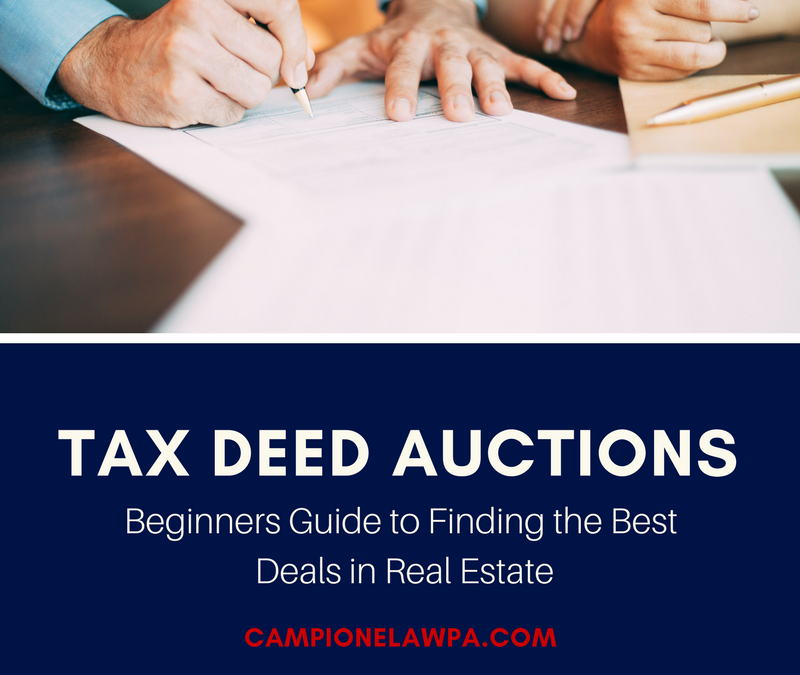Tax Deed auctions are a breeding ground for great deals in real estate. Many people have heard of tax deed auctions but few truly understand their inner workings. I was always told as a child that there are only two things certain in life: “death and taxes.” Every year in Florida, there is property owners that do not pay their property taxes. Property taxes are a significant source of revenue for local government. That being said it is very important for the government to get their money. The Florida legislature and local governments have devised a way to make sure they do not lose out on unpaid property tax revenue.
1. Property owner fails to pay property taxes in a given year.
2. The county in which property is located offers the tax certificate to the lowest bidder in exchange for paying the unpaid taxes. The certificate holder (“lowest bidder”) is an independent investor who actually pays the taxes for a property owner in exchange for the tax certificate. The certificate is awarded to the lowest bidder who will pay the taxes, interest, costs, and accept the lowest rate of interest. A tax certificate is an enforceable first lien against the property for unpaid real estate taxes. The investor make money on the rate of return (interest rate) on the tax certificate when the property owner gets around to paying his unpaid taxes. Bidding on tax certificates starts at 18% and goes all the way down to a .25%.
3. If after two (2) years from April 1 of the certificate issue year the tax certificate holder has not collected on the tax certificate, the certificate holder may petition the clerk of courts to have the property sold at auction (tax deed auction). This is the mechanism that allows the tax certificate holder to recover his principle if the property owner continues to fail to pay his taxes.
When the certificate holder petitions the clerk to force the sale of the property the clerk and tax collector are required to send notices to the required parties of the pending sale.
4. If the property owner still fails to pay their property taxes, the property will be sold at a tax deed auction conducted by the clerk of courts to the highest bidder.
5. The opening bid for the property includes all outstanding taxes, interest, and fees incurred by the clerk in offering the property for sale. It does not include nuisance liens or any other special assessments, even though these liens and assessments are required to be included in the opening bid by Florida Statute.
6. The amount of money that property sells for above the opening bid is called the surplus. Florida statute requires surplus to first be used to pay off any liens or special assessments. If surplus remains, additional surplus monies will escheat to the original property owner.
7. If you are the highest bidder, you are generally required to make full payment within 24 hrs. of your purchase. This varies slightly by county. 5% or $200 is required at the time of the winning bid. If you fail to make full payment within the prescribed time, your deposit will be forfeited and your bidder account will be closed. The property owner may redeem the property by paying the taxes in full any time before you make full payment. If this happens your deposit will be returned, but you are out of luck as to the acquisition of the property.
8. If you otherwise successfully purchase the property after making the highest bid, you recieve a Tax Deed. A Tax Deed entitles you to possession of the property. This means the only way you can sell the property without incurring additional cost is via quick claim deed or special warranty deed.
9. I would advise any buyer to wait until you actually have the physical deed in your hand before you make contact with existing tenants and commence any work on the property, as county governments are known to make mistakes and unilaterally invalidate sales, among other shady practices. Once you have possession of the deed you will have legal recourse in the above situation.
10. Next, it is important to figure out if anyone actually lives on the property you purchased. The easiest way to figure out whether or not someone is living on the property is to call the power company. If the power is on, good chance somebody lives there. If it is not on, confirm how long it has been off. If the power has been off for over a year call you will likely be required to have a safety inspection completed before you can have the power turned on. A safety inspection generally costs about $300 – $400.
11. If there is a tenant living on the property and you intend to keep it as a rental, always try to negotiate with the existing tenant to begin paying you rent. This will save you a fortune, as you will likely not have to exert large sums of money making repairs and procuring a new tenant. Send the tenant a 3-day notice. A 3-day notice requires the tenant to vacate or in the alternative contact the property manager if they have an interest in renting the property.
12. If the existing tenant does not want to work with you and refuses to leave the premises, you will be required to commerce an ejectment action in a court of law. These are costly and very time consuming, but are similar in nature to an eviction.
13. If you have any interest in selling the property within the first four years of ownership you will need to complete a quiet title action in order to sell the house with clear title. Clear title is required by the bank if the buyer is using a mortgage to purchase the property.




 Christopher David Campione has always held a deep passion for helping others. His unmatched dedication to the pursuit of justice and aggressive defense of his clients sets him apart from his colleagues.
Christopher David Campione has always held a deep passion for helping others. His unmatched dedication to the pursuit of justice and aggressive defense of his clients sets him apart from his colleagues.